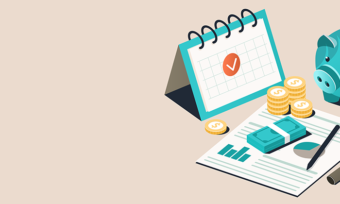They say that there’s no such thing as a stupid question, and that certainly applies to any questions about money. But sometimes it doesn’t feel like that. You may think it’s something simple and don’t want to come across as silly for not knowing the answer. So to save you the discomfort, here are the answers to six money questions you might be too embarrassed to ask – even though you shouldn’t be.
What is a credit score and why should I care about it?
A credit score is a number between 0 and 1000 that indicates how credit-worthy you are. How credit-worthy you are is decided based on your credit history, which is detailed in your credit report. Have you paid all your bills on time? Have you gotten out lots of loans in the past, and did you miss any of the repayments?
All of these things go onto your credit report and impact your credit score. And, in turn, your credit score impacts your borrowing power. If your score is high, your custom will be more readily accepted by banks, telcos, lenders and even insurance companies. If your score is low, you could find your application being rejected, or if it’s accepted you will pay higher interest rates.
→Related article: How to Improve Your Credit Rating: 7 Steps
How much money do I need to start investing?
It’s a common misconception that you need a lot of money to invest, but these days it’s possible to get started with as little as $100 with investing platforms such as Sharesies, Hatch and Stake.
If you want to invest in shares or exchange-traded funds (ETFs) you’ll want at least $500 plus the cost of brokerage to get started. One of the downsides of investing with a smaller amount is the impact the brokerage fee has on your returns. Let’s say you invest $500 and the brokerage fee is $10, you’d need your investment to increase by at least 4% to break even (this is based on paying $10 to both buy and sell your investment). Now, if you start with $2000 the value of your investment would only need to go up by 1% for you to break even.
Compare online share traders with Canstar
Is it bad if I don’t pay off my credit card debt in full every month?
Ideally, you should be paying off your credit card debt in full by the due date. If you don’t, then you will be charged interest on the outstanding balance. You’ll also have to pay interest on any new purchases you make after the due date until you pay off the debt in full, effectively losing the benefit of the interest-free period. So it certainly pays to pay off your outstanding balance as soon as you can to avoid the interest charges adding up.
If you can’t pay it off in full you should, at the very least, make the minimum repayment on time. This can help you avoid any late fees that may apply and you won’t have to worry about a missed payment being listed on your credit report.
A word of warning, though. If you continuously only pay the minimum payment amount the interest costs will add up significantly and it will take you a very long time to clear the debt so this is not something you want to do long term. If you are having trouble with debt it’s worth seeking help (see next point).
Compare credit cards with Canstar
I’m in over my head with debt – can a financial adviser help me?
If you’re struggling with debt and not sure how to get on top of things, it’s important to ask for help, but you will probably be better off talking to a financial counsellor than a financial adviser.
A financial adviser can help you plan for your future and typically provide advice on things such as investing, superannuation, planning for retirement, estate planning and insurance, and you have to pay for the service.
Financial counsellors specialise in helping people who are having problems with debts or experiencing financial difficulty and they do it for free.
→Related article: Free Financial Advice in NZ: Where to Find it
What exactly is compound interest?
You’ve probably heard the words compound interest thrown around. You may also have heard that Albert Einstein described compound interest as the eighth wonder of the world. But what is it? Simply speaking, it is interest earned on interest and it can help you grow your savings at a faster rate.
To really harness the power of compound interest you should start saving as soon as possible and regularly top up your savings.
→Related article: Best High Interest Savings Accounts in New Zealand
About the reviewer of this page
This report was reviewed by Canstar Content Producer, Caitlin Bingham. Caitlin is an experienced writer whose passion for creativity led her to study communication and journalism. She began her career freelancing as a content writer, before joining the Canstar team.
Enjoy reading this article?
You can like us on Facebook and get social, or sign up to receive more news like this straight to your inbox.
By subscribing you agree to the Canstar Privacy Policy





Share this article